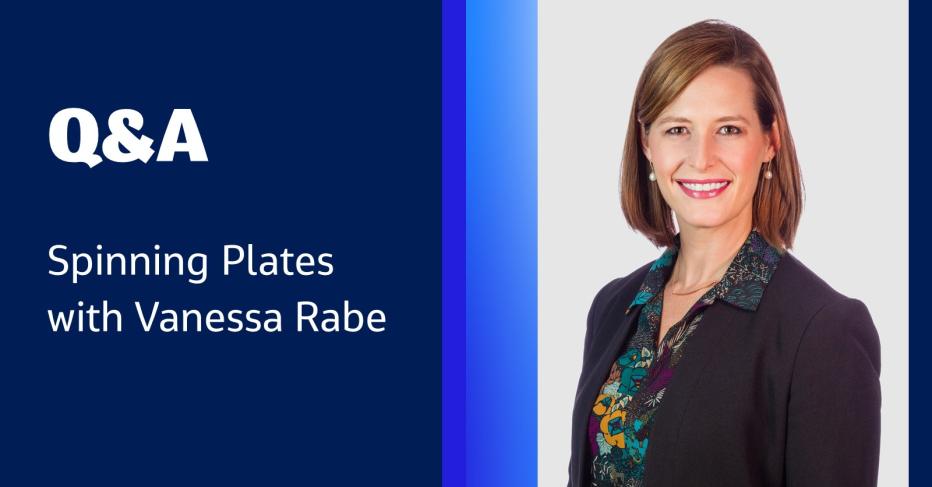
As Principal, Program Manager and Buildings Architecture Group Leader for Central Texas, Vanessa Rabe maintains many active roles – leading and listening to her colleagues, guiding clients through complex projects, and challenging herself in her work. We caught up with her to hear about the many responsibilities she has at Jacobs.
Can you explain your role with Jacobs?
I wear a few different hats at Jacobs. I wear a “people” hat as the architectural group lead for Central Texas, with about 15-20 architects and designers in Austin and San Antonio reporting to me. Wearing my “project” hat, I’m a Principal and Senior Project Manager for Architecture, with experience in higher education and state and local work. On a given project, that means I’m responsible for the client account, the project team, contracts and deliverables, budgets and schedules – everything involved in making sure our clients are happy at the end of the day. I also look ahead and help clients grow and identify future projects. Sometimes it’s like I’m spinning plates at the circus – some as fragile as my grandmother’s china– and I have to prioritize them. Once I get one plate spinning, I switch to another, and that’s part of what makes being a solutions provider great.
What do you think is particularly exciting about your architectural projects?
What’s really exciting is how changing the physical makeup of a place changes the user experience, whether it’s employees or students proud to enter their workplace or classroom, or even people walking or driving by, noticing a building’s design.
It’s even more exciting to think about who uses the spaces. When we design a business school, we are designing a space that will inspire and empower students with big, bright ideas. When we design a research building, we set the stage for researchers to experiment with some of the coolest new things that will change our world – like facades that reflect the sun, new vaccine delivery techniques – technologies that may benefit us all later!
What are you most proud of in your work with Jacobs?
I’m proud that we serve so many repeat clients. A client could say, “we love our new building,” but if the process to get there was a negative experience, they wouldn’t work with us again. We are masters at project delivery, executing extremely complicated design and engineering projects through extremely good communication. It’s our job to guide our clients through a complex process. This work is our day job, not theirs, so a smooth and successful process is what makes for a satisfied client. The fact that clients come back to us again and again means that we’re achieving that great experience for them.
More personally, I’m proud of the universal feedback I receive. Whether you talk to someone who reports to me or a regional leader, the message about how I operate, work with a team, or lead a client project is largely the same. Being a consistently honest, trusted advisor is how I operate, no matter whom I’m working with.
Which projects are you particularly proud of in your career, and why?
Any project where I’m able to work alongside a client and help them define what they need. We design what they need, but more importantly, partner with them to figure out what questions they should ask in the first place. Much of our higher education, manufacturing and state and local work is set up this way. In addition to being the architect of record, we’re also trusted partners who help through a process.
What do you think makes a great project team?
People with diversified experience – that listen. As architects, we are expert generalists. We must know enough about many disciplines to be successful and we need a diversity of experience to deliver technical projects that satisfy our clients. The ability to listen is also extremely important. When people are set in their ways or have their own agendas, a project can fail; but when a group of people listen to each other and understand the why behind what we’re doing, the team becomes extremely collaborative.
Why do you feel diversity is important in your work?
A diverse group of people bring different life experiences and lessons learned to a project.
If everyone on a team brought the same life experiences, the project would be limited by the extent of that shared experience. The more parts and pieces people can bring to bear, the more successful a project can be, and the more value it can bring to a client and the individual members of the project team.
What is the most fulfilling part of your career?
The opportunity to lead – to give my team the autonomy to do what they need to do. When they feel empowered and enabled, they’ll delight the client, who will be satisfied and return to Jacobs.
Tell us something you’ve learned recently, on or off the job.
You don’t have to be one hundred percent sure before you go after something. You can take courageous, calculated risks. After all, failure is not the worst thing that can happen – not trying is worse. That growth mindset will help you, Jacobs, and our clients improve and be better than before.
Why do you enjoy being a part of Jacobs?
I like being able to focus on what’s in my wheelhouse on a day to day basis, but also being encouraged to think about my growth potential. We all should be challenging ourselves and looking for areas to learn, improve, and grow into.












































